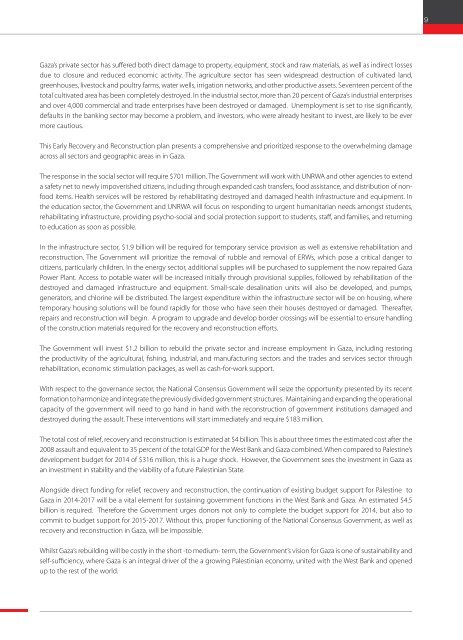National Early Recovery and Reconstruction Plan for Gaza 2014-2017_FINAL...
National Early Recovery and Reconstruction Plan for Gaza 2014-2017_FINAL...
National Early Recovery and Reconstruction Plan for Gaza 2014-2017_FINAL...
You also want an ePaper? Increase the reach of your titles
YUMPU automatically turns print PDFs into web optimized ePapers that Google loves.
9<br />
<strong>Gaza</strong>’s private sector has suffered both direct damage to property, equipment, stock <strong>and</strong> raw materials, as well as indirect losses<br />
due to closure <strong>and</strong> reduced economic activity. The agriculture sector has seen widespread destruction of cultivated l<strong>and</strong>,<br />
greenhouses, livestock <strong>and</strong> poultry farms, water wells, irrigation networks, <strong>and</strong> other productive assets. Seventeen percent of the<br />
total cultivated area has been completely destroyed. In the industrial sector, more than 20 percent of <strong>Gaza</strong>’s industrial enterprises<br />
<strong>and</strong> over 4,000 commercial <strong>and</strong> trade enterprises have been destroyed or damaged. Unemployment is set to rise significantly,<br />
defaults in the banking sector may become a problem, <strong>and</strong> investors, who were already hesitant to invest, are likely to be ever<br />
more cautious.<br />
This <strong>Early</strong> <strong>Recovery</strong> <strong>and</strong> <strong>Reconstruction</strong> plan presents a comprehensive <strong>and</strong> prioritized response to the overwhelming damage<br />
across all sectors <strong>and</strong> geographic areas in in <strong>Gaza</strong>.<br />
The response in the social sector will require $701 million. The Government will work with UNRWA <strong>and</strong> other agencies to extend<br />
a safety net to newly impoverished citizens, including through exp<strong>and</strong>ed cash transfers, food assistance, <strong>and</strong> distribution of nonfood<br />
items. Health services will be restored by rehabilitating destroyed <strong>and</strong> damaged health infrastructure <strong>and</strong> equipment. In<br />
the education sector, the Government <strong>and</strong> UNRWA will focus on responding to urgent humanitarian needs amongst students,<br />
rehabilitating infrastructure, providing psycho-social <strong>and</strong> social protection support to students, staff, <strong>and</strong> families, <strong>and</strong> returning<br />
to education as soon as possible.<br />
In the infrastructure sector, $1.9 billion will be required <strong>for</strong> temporary service provision as well as extensive rehabilitation <strong>and</strong><br />
reconstruction. The Government will prioritize the removal of rubble <strong>and</strong> removal of ERWs, which pose a critical danger to<br />
citizens, particularly children. In the energy sector, additional supplies will be purchased to supplement the now repaired <strong>Gaza</strong><br />
Power <strong>Plan</strong>t. Access to potable water will be increased initially through provisional supplies, followed by rehabilitation of the<br />
destroyed <strong>and</strong> damaged infrastructure <strong>and</strong> equipment. Small-scale desalination units will also be developed, <strong>and</strong> pumps,<br />
generators, <strong>and</strong> chlorine will be distributed. The largest expenditure within the infrastructure sector will be on housing, where<br />
temporary housing solutions will be found rapidly <strong>for</strong> those who have seen their houses destroyed or damaged. Thereafter,<br />
repairs <strong>and</strong> reconstruction will begin. A program to upgrade <strong>and</strong> develop border crossings will be essential to ensure h<strong>and</strong>ling<br />
of the construction materials required <strong>for</strong> the recovery <strong>and</strong> reconstruction ef<strong>for</strong>ts.<br />
The Government will invest $1.2 billion to rebuild the private sector <strong>and</strong> increase employment in <strong>Gaza</strong>, including restoring<br />
the productivity of the agricultural, fishing, industrial, <strong>and</strong> manufacturing sectors <strong>and</strong> the trades <strong>and</strong> services sector through<br />
rehabilitation, economic stimulation packages, as well as cash-<strong>for</strong>-work support.<br />
With respect to the governance sector, the <strong>National</strong> Consensus Government will seize the opportunity presented by its recent<br />
<strong>for</strong>mation to harmonize <strong>and</strong> integrate the previously divided government structures. Maintaining <strong>and</strong> exp<strong>and</strong>ing the operational<br />
capacity of the government will need to go h<strong>and</strong> in h<strong>and</strong> with the reconstruction of government institutions damaged <strong>and</strong><br />
destroyed during the assault. These interventions will start immediately <strong>and</strong> require $183 million.<br />
The total cost of relief, recovery <strong>and</strong> reconstruction is estimated at $4 billion. This is about three times the estimated cost after the<br />
2008 assault <strong>and</strong> equivalent to 35 percent of the total GDP <strong>for</strong> the West Bank <strong>and</strong> <strong>Gaza</strong> combined. When compared to Palestine’s<br />
development budget <strong>for</strong> <strong>2014</strong> of $316 million, this is a huge shock. However, the Government sees the investment in <strong>Gaza</strong> as<br />
an investment in stability <strong>and</strong> the viability of a future Palestinian State.<br />
Alongside direct funding <strong>for</strong> relief, recovery <strong>and</strong> reconstruction, the continuation of existing budget support <strong>for</strong> Palestine to<br />
<strong>Gaza</strong> in <strong>2014</strong>-<strong>2017</strong> will be a vital element <strong>for</strong> sustaining government functions in the West Bank <strong>and</strong> <strong>Gaza</strong>. An estimated $4.5<br />
billion is required. There<strong>for</strong>e the Government urges donors not only to complete the budget support <strong>for</strong> <strong>2014</strong>, but also to<br />
commit to budget support <strong>for</strong> 2015-<strong>2017</strong>. Without this, proper functioning of the <strong>National</strong> Consensus Government, as well as<br />
recovery <strong>and</strong> reconstruction in <strong>Gaza</strong>, will be impossible.<br />
Whilst <strong>Gaza</strong>’s rebuilding will be costly in the short -to medium- term, the Government’s vision <strong>for</strong> <strong>Gaza</strong> is one of sustainability <strong>and</strong><br />
self-sufficiency, where <strong>Gaza</strong> is an integral driver of the a growing Palestinian economy, united with the West Bank <strong>and</strong> opened<br />
up to the rest of the world.


